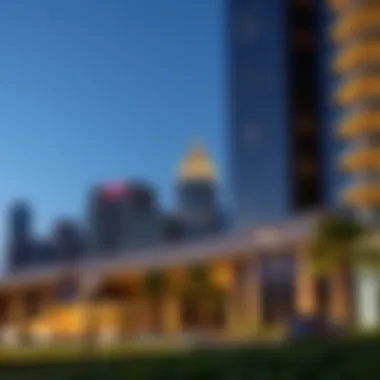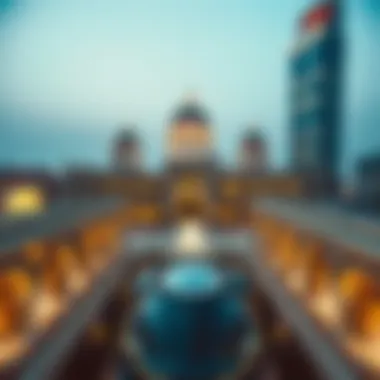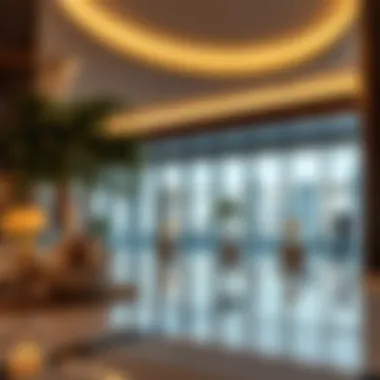Exploring the Eye of the Gulf: Dubai's Property Insights


Intro
Dubai’s property market has become an irresistible draw for investors, expats, and anyone in search of an opulent lifestyle. The term “Eye of the Gulf” encapsulates this allure, shining a spotlight on the glitzy landscapes and high-stakes investments that characterize this majestic city. As the market evolves at an astonishing pace, it’s vital for stakeholders to stay ahead of the curve, armed with insights and knowledge about the latest developments and trends.
Delving into this intricate setting is akin to peeling back layers of an onion; every layer reveals new opportunities and challenges. From soaring skyscrapers to architectural marvels, the diverse offerings of Dubai’s real estate reflect both local culture and international influence. As we embark on this exploration, we will examine the current trends shaping the market, investment hotspots, and what makes Dubai a sought-after destination for property investment.
Market Trends
Current Real Estate Landscape
Swimming through the waters of Dubai’s real estate can at times feel a bit like trying to catch a slippery fish. The market is characterized by a blend of established neighborhoods and rapidly developing areas, each with unique offerings for potential buyers and investors. Among the key factors influencing this landscape are the influx of international buyers, an ever-growing expat community, and ambitious government initiatives aimed at bolstering investment.
Dubai’s strategic location still remains a standout feature, positioning it as a gateway between East and West. The Expo 2020, even amidst pandemic challenges, has contributed to increased visibility, drawing attention not just to local properties but also to global investors and corporations who see the potential of a venture in this bustling marketplace.
Property Price Trends
As one might expect from a market as dynamic as this, property prices in Dubai have shown fluctuation, much like the Gulf waves during a storm. Recently, however, trends indicate a stabilization following several years of ups and downs. While luxury properties in districts like Dubai Marina and Downtown Dubai command a premium, emerging neighborhoods like Dubai South and Jumeirah Village Circle are seeing substantial growth in demand due to their affordability and improved infrastructure.
- Key Observations:
- Prices in prime locations are stabilizing, whereas emerging areas are on an upward trajectory.
- Investors are increasingly leaning toward off-plan properties, which can offer better ROI as these develop.
One important takeaway from the pricing trends is that the market places a distinct emphasis on quality and uniqueness, with buyers often gravitating towards properties that offer lifestyle enhancements, be it proximity to amenities, innovative designs, or aesthetic appeal.
Investment Opportunities
High-Return Areas
When it comes to investment, identifying the right area is like finding gold in a treasure chest. Changing consumer preferences have shifted the spotlight onto areas that not only promise returns but offer a lifestyle that resonates with residents. Some neighborhoods like business Bay are seeing a distinct surge due to the thriving commercial landscape, while others are gaining attention due to lifestyle offerings.
- Emerging Hotspots:
- Dubai Marina: Known for waterfront living and vibrant nightlife, this area continues to attract high rental yields.
- Meydan: With expansive developments and lush landscapes, it is becoming popular among families seeking spacious homes.
Upcoming Developments
Looking towards the future, Dubai has no shortage of ambitious projects underway. These upcoming developments reflect the city’s commitment to innovation and economic growth. Projects such as the Mohammed Bin Rashid City aim to create a premier lifestyle destination, featuring residential, commercial, and recreational spaces all within one grand vision.
- Highlighted Projects:
- Dubai Creek Harbour: Set to house the world’s tallest tower, this project is indicative of Dubai’s relentless pursuit of grandeur.
- Bluewaters Island: This newly developed hub combines leisure, retail, and residential space, offering a unique living experience.
With the right knowledge, investors can navigate this complex landscape effectively, ensuring that every move made within the market is as calculated as a game of chess. Before diving in, consider understanding your needs, assessing the various properties available, and staying attuned to the ever-changing dynamics of the Eye of the Gulf.
"Investing in Dubai is not just about properties; it's about creating a lifestyle that bridges the traditional and modern."
For further insights into Dubai’s real estate dynamics, resources such as Dubai Land Department and Property Finder can provide valuable data and trends.
Understanding the Eye of the Gulf
The 'Eye of the Gulf' serves as more than just a phrase most commonly associated with Dubai; it encapsulates the city's signature fusion of modernity and tradition, particularly in its real estate sector. This concept is vital for investors, homeowners, and real estate professionals who want to navigate the complexities of Dubai's unique property market. As the world centers its gaze on Dubai—often regarded as the nexus of opportunity and culture—understanding the dynamics of the Eye of the Gulf becomes indispensable.
This exploration does not merely illustrate the properties within the Gulf; instead, it highlights the vibrant lifestyle, lucrative investment avenues, and the regulatory structures in place that work together to make Dubai an attractive option for real estate endeavors. Consider these aspects as we dive deeper into the following sections, which will shed light on significant factors shaping this booming market. The charm of Dubai isn't just in its skyline; it's in the options available to potential buyers and investors alike.
Defining the Concept
The idea of the Eye of the Gulf stands at the intersection of luxury and accessibility. It represents a panoramic view of not only the stunning architecture that graces the horizon but also the complex tapestry of cultures that make up its local communities. To define this concept is to recognize that Dubai's real estate market is witnessing a transition.
In the past, luxury properties would often be the hallmark of the rich and famous, limited to an elite few. Today, however, the Eye of the Gulf embodies inclusivity; there is a diverse range of properties catering to different income levels and lifestyle preferences. More than stunning views and exquisite amenities, it's about the emotions tied to owning a piece of this city—a city that contributes to the narrative of globalism while retaining its rich Arabic heritage.
Historical Context
Dubai’s transformation from a humble fishing village to a global powerhouse is nothing short of remarkable. To fully grasp the significance of the Eye of the Gulf, one must review the history that has paved the way for the present. In the early 20th century, Dubai relied heavily on fishing and pearling for income. However, the discovery of oil in the 1960s marked the turning point. It propelled the city into a new era of economic growth that set the stage for rapid urbanization.
Interestingly, while the oil boom played a crucial role, Dubai’s leaders made strategic decisions to diversify the economy, investing in tourism, aviation, and, crucially, real estate. This foresight led to the establishment of numerous landmark projects, such as the Burj Khalifa and Palm Jumeirah, which are now synonymous with luxury and innovation.
In this light, the Eye of the Gulf is not just a metaphorical lens through which to view real estate; it represents a culmination of eclectic history, transitioning from traditional roots to a high-rise future that continues to attract the keen eyes of investors worldwide.
"Dubai has become the epicenter of real estate investment, drawing attention from diverse global markets due to its unique blend of modern comforts and rich cultural heritage."
Understanding this historical context helps potential investors appreciate the journey of Dubai’s property market. It provides a framework for identifying how past experiences inform present opportunities and future possibilities.
The Real Estate Landscape in Dubai
Understanding the real estate landscape in Dubai is crucial for grasping the intricacies of the 'Eye of the Gulf'. This thriving metropolis has become a focal point for property investors, both local and international. The real estate market here is not just about bricks and mortar; it embodies the essence of a rapidly evolving, multicultural society. As investors and homeowners navigate this dynamic environment, numerous factors come into play that make Dubai unique.


Current Market Trends
In Dubai, trends in the real estate market are as fluid as the tides in the Gulf. The ongoing recovery of the market following the global economic slowdown demonstrates resilience. Properties in Dubai are witnessing increasing demand across various segments. Key trends include a shift towards sustainable developments and a rise in smart home technology, making properties more appealing, especially to younger buyers who prioritize energy efficiency and innovation.
The rental market also displays exciting shifts. With many expatriates returning to Dubai after the pandemic, occupancy rates in residential properties have significantly increased, driving up rental prices. Investment in residential developments—especially in family-friendly neighborhoods—has become particularly appealing. Furthermore, short-term rental markets are booming, largely driven by tourism. This is a crucial element for investors looking to capitalize on Dubai's vast tourism potential, which continuously brings in the crowds.
Key Investment Hotspots
When considering investment in Dubai, specific locales rise to the forefront as prime investment hotspots, attracting attention like moths to a flame. Some notable areas include:
- Dubai Marina: Known for its stunning waterfront views and luxurious lifestyle, it’s an area that caters to high-end investors. Residents enjoy access to upscale amenities—restaurants, shops, and leisure facilities that pulse with energy day and night.
- Downtown Dubai: Home to the iconic Burj Khalifa and The Dubai Mall, properties in Downtown offer not just luxury but also strong rental yields. This area is a magnet for tourists, ensuring a steady stream of tenant interest.
- Jumeirah Village Circle (JVC): A family-oriented community known for budget-friendly housing with a mix of villas and apartments. It appeals to both locals and expats seeking value without compromising on quality.
- Business Bay: This is where innovation and commerce intersect. With numerous commercial properties rising in this bustling hub, it's ideal for businesses looking to set up shop in an environment teeming with opportunities.
- Palm Jumeirah: This iconic man-made island is synonymous with luxury. Investing here is not only about properties but also about securing a lifestyle that most can only dream of.
"Navigating the Dubai property market requires a careful assessment of trends and hotspots, enabling investors to make informed decisions that align with their financial goals."
The choice of where to invest can make or break one’s venture in Dubai. Through understanding the current trends and identifying the right hotspots, investors can position themselves strategically, capitalizing on the unique opportunities that the Eye of the Gulf presents. As the property landscape continues to evolve, tapping into these insights can provide a robust framework for successful investments.
Property Types in Eye of the Gulf
The real estate sector in Dubai offers a diverse array of property types, which is critical to understanding the unique investment opportunities within the Eye of the Gulf. Each category comes with its own set of perks and considerations, attracting a wide range of buyers and investors. Tapping into these distinct property types can lead to smarter investment decisions, catering to different lifestyles and financial objectives.
Real estate may be a serious business, but it’s not all about cold numbers. Not only does knowing the types of properties available assist in navigating the market, but it also opens doors to discovering what fits personal needs or business goals perfectly. This section covers the three significant types of properties in Dubai: Residential Properties, Commercial Real Estate, and Luxury Developments.
Residential Properties
Dubai's residential property market is quite vibrant. This category encompasses a lot—from quaint apartments in downtown to sprawling villas in upscale communities. Understanding the trends here can reveal where to put your money for the best returns.
Individuals looking to settle down in Dubai often find that residential properties present a wealth of options. The common choices include high-rise apartments in areas like Dubai Marina, townhouses in Jumeirah, and luxurious villas in communities such as Emirates Hills. Each neighborhood brings its own vibe, amenities, and price brackets, which is key for potential homeowners or investors.
- New Developments: The city constantly welcomes new projects, increasing supply and offering fresh options.
- Rental Potential: Many investors look towards residential properties for income generation through rentals. Popular areas tend to see consistent demand.
- Amenities: Many residential properties boast excellent facilities, including swimming pools, gyms, and parks.
The potential for appreciation is often promising here, pushing investors to consider long-term commitments.
Commercial Real Estate
The commercial real estate sector is another pillar of Dubai’s property landscape. This type of property varies from office spaces and retail outlets to warehouses. Each segment has its unique dynamics and challenges.
An overview of commercial properties reveals potential for lucrative returns through leasing and resale:
- Business Zones: Areas such as Dubai International Financial Centre (DIFC) offer specialized environments for financial firms, while tech companies might opt for spaces in Dubai Silicon Oasis.
- High Demand: The surge in economic activities, particularly after major events like Expo 2020, fuels a strong demand for office spaces.
- Short-Term Leases: Many businesses are looking for flexible lease arrangements, particularly in a post-pandemic world.
Investors wary of volatility should look closely at location and tenant stability when scouting for commercial properties.
Luxury Developments
Luxury properties represent the pinnacle of Dubai’s real estate scene, often embodying extravagance and architectural marvel. These high-end offerings attract a global clientele looking for opulence and unique lifestyles.
Key aspects of luxury developments include:
- Exclusive Locations: Areas such as Palm Jumeirah or the Burj Khalifa neighborhood are synonymous with luxury, giving buyers more than just homes—what they gain is status.
- Unique Features: Many luxury residences come equipped with state-of-the-art technology, private pools, and stunning views of the Arabian Gulf.
- High Resale Value: Given the exclusivity, properties in this segment tend to maintain or increase in value significantly over time.
The allure of luxury living in Dubai often translates into ready buyers and high competitive bidding which can yield significant returns for investors.
In wrapping up this section, a thorough understanding of these varying property types not only enriches one's knowledge but also shapes investment strategies in the Eye of the Gulf.
"Investing in Dubai’s real estate isn’t merely a transaction; it’s about securing a lifestyle and future."
By recognizing the unique characteristics of residential, commercial, and luxury developments, prospective buyers and investors can navigate the complex waters of Dubai's property market with more insight.
Lifestyle Considerations
Lifestyle factors play a pivotal role in shaping the appeal of properties located in the Eye of the Gulf. When investors or potential homeowners consider purchasing real estate in Dubai, these aspects can be as crucial as the financial numbers on the property paper.
These lifestyle considerations encompass a range of elements, from the amenities available to the community dynamics and cultural influences swirling around this vibrant city. Each of these factors contributes to the overall living experience, dictating not just where people choose to live but also how they interact with their surroundings and neighbors. Understanding these aspects can effectively highlight both the value of the investment and the quality of life therein.
Amenities and Facilities
Amenities are often the cherry on top of the real estate cake. In Dubai, amenities are abundant and varied, catering to different lifestyles and preferences. Developments in the Eye of the Gulf typically feature world-class facilities that would make anyone's life a little sweeter.
- Gyms and Fitness Centers: Health is a priority for many residents. Many residential complexes boast state-of-the-art fitness centers and swimming pools. Examples include the lavish facilities found in the Marina Gate or the vibrant Dubai Marina Residences.
- Parks and Recreational Areas: Green spaces can vie with the urban skyline. Residents often flock to parks like Al Barsha Pond Park for leisure and social interactions. Spaces that promote outdoor enjoyment and social gatherings can significantly enhance community bonds.
- Transportation Links: Accessibility should never be overlooked. Easy connections to public transport, such as Metro stations, can ease daily commutes, making it easier for residents to navigate the bustling city without the hassle of traffic.
These amenities not only shape the day-to-day life of residents but also increase property values, as prospective buyers look favorably on developments that offer a holistic living experience.
Community Living
Community living in the Eye of the Gulf is a tapestry woven from various threads. The sense of belonging is critical; it evokes feelings of safety and friendliness that can’t be quantified.


- Diverse Neighborhoods: Dubai's neighborhoods, from Jumeirah Beach Residence to Downtown Dubai, blend cultures and lifestyles. This diversity creates a rich communal scene where interactions among residents of different backgrounds foster overall community spirit.
- Social Events: Many developments organize social events, like community festivals or seasonal markets. These opportunities for gathering are essential in bringing people together, strengthening ties, and ensuring residents feel connected.
- Safety and Security: A focus on safety and well-being often makes residents choose developments known for their secure environments. Features like gated communities or 24/7 security services ease concerns, allowing residents to enjoy life without unease.
Community living not only enhances well-being but also drives up demand as potential residents look for more than just a roof over their heads but also a sense of belonging.
Cultural Influences
The cultural milieu of Dubai is a feast for the senses; it impacts property appeal and influences lifestyles. Understanding the cultural nuances can be an asset for investors and homeowners alike.
- Blend of Tradition and Modernity: Buildings like Burj Khalifa reflect modern architecture, while places such as Jumeirah Mosque highlight Dubai’s rich cultural heritage. This blend makes the lifestyle dynamic and diverse.
- Culinary Diversity: Dubai's food scene is an embodiment of its cultural mix. Residents can savor everything from street food to gourmet experiences, allowing them the chance to connect with global cuisines without needing to travel.
- Cultural Festivals: Events such as Dubai Shopping Festival and Art Dubai not only attract tourists but also engage the community, offering a chance for residents to participate in the city's evolving cultural narrative.
Each of these cultural strands influences how people perceive living in Dubai. They create an enriching atmosphere that is hard to match elsewhere.
"In real estate, understanding the lifestyle aspects can mean the difference between just selling a property and selling a whole living experience."
These lifestyle considerations are essential for investors and residents alike, shaping not only the way individuals live but also how they perceive the value of their investment in the Eye of the Gulf.
Real Estate Investment through Eye of the Gulf Lens
When discussing the real estate landscape in Dubai, it’s essential to view it through the "Eye of the Gulf" lens. This perspective encapsulates the unique features, strategic advantages, and potential pitfalls of investing in one of the world’s most dynamic markets. If you are new to this arena or looking to expand your portfolio, understanding how the Eye of the Gulf influences investment decisions can greatly enhance your strategic outlook.
Investing in the Dubai property market offers myriad benefits, including impressive returns and opportunities in a culturally rich environment. The city's rapid development and modern infrastructure contribute to a vibrant and appealing living space. Additionally, Dubai's reputation as a global hub for commerce, tourism, and luxury living attracts a diverse clientele, making it an ideal location for property investment.
However, investment isn’t all sunshine and rainbows. Potential investors must consider various elements that can influence their decisions.
Understanding Investment Strategies
Adopting the right investment strategies is crucial when navigating Dubai's property market. Here are some effective approaches that can be tailored to fit individual goals:
- Long-term Rentals: Purchasing property for long-term rental can provide a steady income stream. With expatriates and tourists flocking to the city, the demand for residential accommodations is persistent.
- Short-term Vacation Rentals: With the rise of platforms like Airbnb, investing in properties designed for short-term rentals can yield substantial returns, especially in popular tourist areas like Dubai Marina or Downtown Dubai.
- Off-plan Projects: Investing in properties before they are completed often requires a lower initial payment and can result in significant capital appreciation upon project completion. However, timing and market analysis are key here.
- Value-Added Investments: Look for properties that may need renovation or modernization. Adding value through improvements can increase rentals or resale value significantly.
In Dubai, understanding the legal landscape is also crucial. Familiarity with property regulations, ownership rights, and local laws can save investors from unwelcome surprises down the road.
Risk Assessment in Real Estate
Investment in real estate involves risk, which can take various forms. In the context of the Dubai property market, it's essential to conduct a thorough risk assessment:
- Market Volatility: Although Dubai has shown remarkable resilience, fluctuations in property prices can pose risks. Economic shifts, geopolitical events, and changes in foreign investment policies can influence market stability.
- Regulatory Changes: Investors must be alert to changes in local regulations affecting purchase laws, taxes, and fees. Staying abreast of changes from the Dubai Land Department or real estate regulatory agencies is key.
- Financing Risks: Investors should consider financing terms and bank interest rates. Fluctuating interest rates can alter the cost of borrowing, impacting overall investment returns.
- Economic Factors: Global events like financial crises or pandemics can inherently affect the market. Tracking trends and understanding the broader economic indicators can prepare investors for potential downturns.
In summary, viewing real estate investment through the Eye of the Gulf lens equips investors with valuable insights into strategies and risk considerations necessary for success in Dubai's property market. Whether looking for steady cash flow or capital appreciation, understanding these dynamics is essential for making informed decisions.
Regulatory Framework
Understanding the regulatory framework surrounding Dubai's real estate market is crucial for anyone looking to invest in the region. This framework not only shapes how properties can be bought and sold but also steers the entire market’s growth trajectory. Without a solid grasp of the laws and regulations, investors may find themselves in tricky situations or face unexpected challenges.
A well-defined regulatory structure ensures transparency and promotes fair practices within the market. It creates a safe environment for both local and international investors. This becomes increasingly important in a city known for its rapid transformation and booming real estate developments. By investing time in understanding these laws, potential buyers can navigate the market more confidently, armed with knowledge about what to expect.
Overview of Property Laws
The property laws in Dubai are tailored to encourage investments while safeguarding the rights of property owners. Key aspects of these laws include:
- Freehold Ownership: Foreigners can acquire freehold property in designated areas, which allows for complete ownership.
- Leasehold Agreements: Those interested in property outside freehold areas often opt for leasehold agreements, typically lasting up to 99 years.
- Regulatory Bodies: Entities such as the Dubai Land Department and the Real Estate Regulatory Agency oversee property dealings to maintain accountability and legality.It is noteworthy, however, that understanding these laws is just the tip of the iceberg. Changes can occur, and it's important to stay abreast of any updates or amendments to existing laws to avoid legal pitfalls that can affect investment outcomes.
Investment Incentives for Foreign Investors
Dubai actively encourages foreign investments in its real estate sector, offering numerous incentives that make it an attractive proposition:
- 100% Foreign Ownership: In many areas, foreign investors can own property outright, enhancing the allure of Dubai’s investment landscape.
- No Property Tax: There’s no annual property tax in Dubai, which allows for greater returns on investment as investors keep more of their earnings.
- Residency Visa Options: Investing in property worth AED 2 million or more grants the investor and their family residency visas, adding another layer of appeal.
However, while these incentives are enticing, foreign investors should remain aware of potential challenges. Being informed about the nuances of property laws, including Emirati regulations regarding leasing and property management, is essential. Understanding these elements not only helps in maximizing investment returns but also in ensuring a smoother process throughout the ownership period.
"The only way to make a big investment decision is to connect the dots through understanding the current laws and incentivization structures."
In summary, navigating the regulatory framework of Dubai's real estate market equips investors with tools to make well-informed decisions. Familiarity with the intricate property laws and the available incentives ensures a strategic advantage in this competitive landscape.
Future Outlook for the Eye of the Gulf
The future outlook for the Eye of the Gulf is not just a prediction; it's a crucial compass for understanding how Dubai's property market might evolve. Investing in real estate, particularly in a dynamic location like Dubai, means that stakeholders need to keep their fingers on the pulse of various driving forces. This section aims to dissect elements like projected market trends and the broader economic factors that could shape this landscape.
Projected Market Trends
With rapid urbanization and very high demand for real estate in Dubai, predictive analysis reveals certain trends that investors, homeowners, and real estate professionals must keep an eye on.
- Tech Integration: Properties are increasingly incorporating smart technologies. Advanced home automation, security systems, and energy-efficient amenities are becoming the norm rather than an exception. This is not just a trend; it's expected to shape demand in future developments.
- Sustainability Focus: More developers are focusing on eco-friendly designs and materials. With growing awareness about environmental sustainability, properties that adhere to green building standards are likely to see a bump in valuation and interest from buyers.
- Shift Towards Affordable Housing: While luxury properties will always have their appeal, there's an increasing acknowledgment of the need for affordable housing, especially for young professionals desiring to settle in the city. This change could help balance the market, making it more inclusive.
- International Investments: The influx of foreign capital continues to shape the market. International buyers are increasingly eyeing Dubai not just for personal use but also as a viable option for investment. Locations like Dubai Marina and Jumeirah Beach Residence remain hot favorites, making these areas a focal point for future developments.
As the dynamics alter, understanding these trends becomes essential for making informed investment decisions. Keeping an eye on the aforementioned trends can aid in navigating potential pitfalls and opportunities in this fast-paced environment.


Impact of Global Economic Factors
The regional and global economic landscapes play a significant role in shaping Dubai's property market. Variables like oil prices, global financial stability, and geopolitical developments can have cascading effects.
- Oil Prices: As a key player in the energy sector, fluctuations in oil prices can impact investor sentiment in the Gulf region. An uncomfortable dip could hinder growth momentum, especially in luxury and commercial real estate sectors. Conversely, stable or rising oil prices could fuel market demand and strengthen investor confidence.
- Global Financial Trends: Economies around the world are interconnected. A downturn in major economies can lead to reduced investments in Dubai's properties. Economic shocks, like the one seen during the COVID-19 pandemic, highlight how vulnerabilities can bring a booming market to its knees.
- Geopolitical Stability: Political tensions can cast shadows over the property market. Investors look for safe havens, and if Dubai does not present that level of stability, foreigners might shy away from investing. It's important to recognize that local political stability can act as a magnet, attracting investments when the planet faces unrest.
The synergy of these factors creates a complex network, and the ability to read the signs will determine who thrives in the competitive property market.
Challenges in the Dubai Real Estate Market
The landscape of Dubai’s real estate is as shimmering as its skyline; however, it is not without its pitfalls. Understanding the myriad of challenges is essential for any investor, homeowner, or real estate professional looking to navigate this vibrant market. From keeping a keen eye on fluctuations to unsnarling regulatory webs, the stakes are high, and the learning curve steeper than most expect.
Market Volatility
Market volatility is like a double-edged sword for real estate investors in Dubai. On one hand, it can create ripe opportunities for savvy buyers, while on the other, it can weigh heavy on financial planning and security. This market sees fluctuations that can stem from various factors, such as economic trends or geopolitical tensions.
What to watch for:
- Price Fluctuations: Prices can skyrocket or plummet within a matter of months.
- Demand and Supply Dynamics: An unchecked supply of properties can lead to price slumps.
- Foreign Investment Trends: The entrance or withdrawal of investors can flip market stability.
Understanding how to read the signals can mean the difference between a profitable venture and a sinking ship. Many investors find themselves scratching their heads when the market takes an unexpected turn, making it necessary to adopt a flexible and informed approach. Regularly consulting market reports and engaging with local real estate experts can mitigate some risks.
"A market in flux often yields the highest risk but likewise the highest reward," - Anonymous Investor.
Regulatory Challenges
Navigating the maze of regulations governing real estate can be an intricate task that even seasoned professionals find daunting. Dubai's regulatory framework is regularly updated to ensure it aligns with its ambitious vision but can often confuse potential investors or buyers who are unfamiliar with local laws.
Primary hurdles include:
- Permit Requirements: Securing necessary permits can be a lengthy process that might delay projects.
- Ownership Laws: Foreign ownership is capped in certain areas, affecting where foreign investors can buy.
- Changing Policies: Continuous adjustment of policies means staying abreast of the latest rules is more critical than ever.
Familiarizing oneself with key regulations and potentially seeking out legal counsel becomes indispensable. Whether it's setting up ownership structures or understanding the acquisition process, tackling these regulations up front can save time and headaches down the road.
Sustainable Development in Dubai Real Estate
Sustainable development in Dubai's real estate sector has become a focal point in recent years. With the rapid urbanization and increasing population, it is crucial to ensure that growth doesn’t come at the expense of the environment. The concept of sustainability is not simply a trend; rather, it’s a response to the pressing demands of future generations and the continued livability of urban environments. In the context of Dubai, known for its opulence and grand developments, integrating sustainable practices reflects a significant shift in social responsibility and economic strategy.
The benefits of sustainable development are manifold. At its core, it encourages energy conservation, waste reduction, and the use of renewable resources, which contribute to lower operational costs for property owners. This leads to a ripple effect — when developers adopt green building practices, they not only increase the value of their projects but also attract a growing market of eco-conscious buyers. For potential investors and homeowners, understanding these elements is essential to making informed decisions that align with both personal values and investment goals.
Green Initiatives in Property Development
Dubai has embarked on various green initiatives aimed at reshaping its property development landscape. One noteworthy aspect is the adherence to the regulations set forth by the Dubai Municipality, which promotes eco-friendly building practices through various schemes, such as the Dubai Green Building Codes. These codes set stringent standards for energy efficiency, water conservation, and sustainable materials.
Moreover, numerous high-profile projects have turned their eyes towards sustainability. For example, developments like Masdar City demonstrate innovative approaches to urban design. This city aims to be one of the most sustainable communities worldwide and incorporates a range of green technologies such as solar panels, sustainable public transport, and advanced waste management systems.
Investors looking to dive into Dubai's real estate market should consider properties where sustainability is at the forefront. They often see higher occupancy rates and may offer long-term savings, forming an attractive proposition against traditional developments.
Long-term Viability of Projects
Looking ahead, the long-term viability of real estate projects in Dubai hinges on their commitment to sustainability. As global awareness regarding climate change grows, the demand for green living spaces is expected to increase. This not only covers residential units but extends to commercial spaces as well.
Several developers are already exploring mixed-use projects that integrate workspaces, living quarters, and leisure facilities in ways that minimize the carbon footprint. This multi-faceted approach helps in cultivating vibrant communities while ensuring environmental stewardship.
In real estate investment decisions, investors evaluating long-term potential must consider how sustainability strategies impact overall project success. Properties that offer sustainability features can be seen as a safeguard against market fluctuations, as they often retain their value better over time. Local governments also support these initiatives, providing incentives for projects that prioritize green architecture and urban planning.
"The emphasis on sustainability is not just about being trendy; it's about ensuring that the investments we make today will serve future generations and the planet well."
In summary, the concept of sustainable development in Dubai's real estate sector extends beyond environmental benefits; it encompasses economic viability, attractiveness to investors, and the enhancement of quality of life. As we witness the landscape evolve, it becomes increasingly clear that those who align their strategies with sustainability will lead the pack in this dynamic market.
Closure: The Eye of the Gulf as a Property Investment Hub
In the realm of real estate, the term "Eye of the Gulf" stands as a crucial beacon for understanding Dubai’s property market. Growing fast with its skyscrapers and deluxe developments, this phrase encapsulates so much more than just a geographical indication; it embodies a holistic view of what makes Dubai a hub for property investments. Investors keen on identifying the next best opportunity should recognize the underlying factors that contribute to this notion.
For one, Dubai's strategic geographical position bridges the gap between West and East, making it a central node for international business and commerce. The infrastructure here is nothing short of spectacular, with top-notch roads, air traffic systems, and a modern digital landscape. This has undoubtedly added to the attractiveness of the area, drawing in both local and foreign investments.
Moreover, the regulatory landscape in Dubai is becoming increasingly favorable for property investment. There are programs designed to encourage foreign ownership, and various incentives are presented to make the acquisition process as seamless as possible. These regulatory frameworks serve to instill confidence among potential investors.
Several economic indicators are also pointing in the right direction. The population is on the rise, which correlates directly with housing demand. The blend of a cosmopolitan lifestyle, tourism influx, and business opportunities creates a robust fabric that sustains the property market.
"Dubai’s real estate market isn’t just about skyscrapers; it’s about creating vibrant communities where people want to live and thrive."
This perspective heightens the importance of understanding Dubai's property landscape through the Eye of the Gulf lens. Investors are not merely buying buildings; they are investing in a lifestyle, an experience, and a future.
Recap of Key Insights
- Strategic Location: Serving as a gateway between continents, allowing for significant business activities.
- Robust Infrastructure: Modern transport systems and digital ecosystems are crucial for attracting investment.
- Favorable Regulations: There are incentives aimed at welcoming foreign investors, making entry simpler than many places worldwide.
- Rising Demand: An increase in population and tourism continues to boost the need for diverse property types.
Final Thoughts
To wrap it all up, viewing Dubai’s real estate opportunities through the Eye of the Gulf prism offers a deeper appreciation for what this city represents in the global market. It is a unique blend of luxury, innovation, and practicality that continues to allure both investors and residents alike. Every corner of this vibrant city tells a story of possibility, and for those ready to dive into the investment waters, the prospects appear to be as expansive as the skyline itself. Embracing both the risks and the potential rewards is essential for any investor navigating this captivating landscape.













